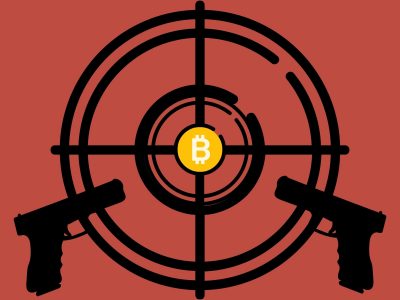A lot of media coverage on cryptocurrency has discussed its implications for illicit markets. Just the other day, I saw a headline that read “Man uses Bitcoin to buy chemical weapon ‘after bad break up.’”
Why did the writer include Bitcoin? I don’t see articles reading “Suspected terrorists use U.S. dollar to purchase guns” or “International arms trade deal done with U.S. dollar.”
Are their points substantiated, then? What exactly does crypto do for these sectors?
Well, crypto can provide anonymity, or at the very least, pseudonymity.

U.S. financial regulators require Know-Your-Customer verification, but that’s pretty easy to work around if there’s enough money moving. Sex workers, large-scale drug dealers and arms dealers could all benefit from this.
Crypto also expedites the fast movement of large sums of money. The cost of moving any amount of money — from the crypto equivalent of $1 billion, or even just $100 — would be approximately $3 currently, and the whole process would take 15 to 60 seconds. International exchanges have never been easier.
But here’s why crypto is a lot less scary — or at the very least, the same amount of scary — when compared to fiat currencies like the U.S. dollar.
The statistics that other crypto journalists spout — such as the fact that only 1% of all Bitcoin transactions are used for illicit purposes as compared to 2% of all U.S. dollar transactions — is a little overplayed and a little self-explanatory. I won’t delve into this.
The bigger problem here is there are institutions specifically supporting unlawful transactions in the traditional banking system.
Seeing as how “suspicious activity” — as the United Nations Office on Drugs and Crime puts it — contributes a minimum of $2 trillion to the global financial and monetary system, it’s no wonder banks have capitalized on this opportunity.
For example, Danske Bank was embroiled in a money laundering scandal. Its Estonian subsidiary was revealed to have laundered around 2 billion Euros for Russian oligarchs and other criminals, including one of Russian President Vladimir Putin’s cousins.
The people at the head of the current global financial system are not just letting situations like this happen — they are active accomplices of these criminals.

With blockchain technology and cryptocurrency, there will be no central institution that will help you launder your money. Sure, the argument can be made that the system doesn’t make it more difficult for criminals, but it sure doesn’t actively make it easier for them.
Furthermore, crypto can actually make it easier to track transactions and therefore, catch criminals.
Cryptocurrencies are run on a blockchain that acts as a ledger. The specifics are complex, but basically, every single transaction that has ever happened or will ever happen with Bitcoin has a specific transaction code. This information, which is publicly available on the Bitcoin blockchain, can be easily tracked by authorities if linked to a real-world identity.
So, the argument that Bitcoin or any cryptocurrencies make money laundering easier for criminals is baseless — or, at the very least, weak.
Media fear-mongering over cryptocurrency has created a false narrative that is harmful for its wide-scale adoption and the ability for the everyday man to stop relying on the private banking system.
It’s true crypto gives the same benefits of ease-of-transfer and decentralization to not just you, but also criminals.
But are we really going to disallow ourselves the opportunity to remove our money from a system that wants to take advantage of us because criminals may also want to do it?
Take back control of your money. You deserve it.
The rise of cryptocurrency will either serve as a wake-up call for the traditional financial system or signal its death — whichever comes first. What we see in the media now is supporters of the status quo who either willfully or unknowingly ignore the fact that all types of mediums of exchange are used in illicit markets.




















































































































Charles Park • Apr 28, 2021 at 8:56 am
I completely agree with Sophia–Al-Qaeda most definitely eats bananas on ocassion, but so do I! That doesn’t mean bananas are dangerous in any capacity.
Sophia Ahn • Apr 28, 2021 at 1:26 am
Exactly! If the news started saying that Al-Qaeda eats bananas for their nutritional value and therefore that bananas are dangerous, what would you do?